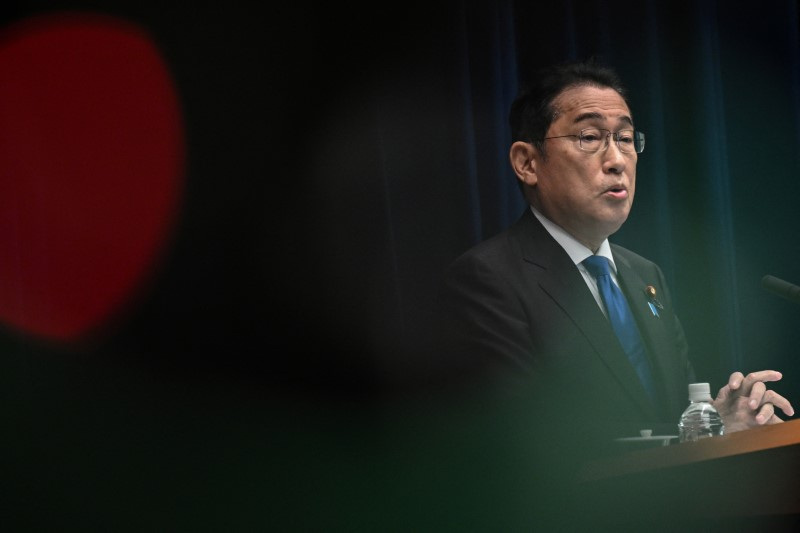(Reuters) – Japanese Prime Minister Fumio Kishida mentioned he’ll step downin September, ending a three-year time period marred by political scandals and paving the way in which for a brand new premier to handle the impression of rising costs.
Listed below are some reactions to the information from market and political analysts:
SHOKI OMORI, CHIEF JAPAN DESK STRATEGIST, MIZUHO SECURITIES, TOKYO
“Political uncertainty isn’t good at all, with Mr. Kishida not even raising his hand for election. The market implication is that Japanese politics is going to be foggy, and whoever the LDP premier will be, the cabinet choice is going to be very unclear and thus the policy path is going to be a mystery. In short, risk-assets, particularly equities, will likely be hit the most, given foreign investors’ attention and big inflow/outflow in the markets.
“Market contributors are going to dislike the unsure state of affairs, particularly these investing in threat belongings, equivalent to equities. PM Kishida pushed for New NISA (funding accounts) and now he’s pulling again. Yen goes to rely upon exterior components particularly U.S. knowledge and the Fed. JGBs will nonetheless stay a provide/demand market. My preliminary view is that equities are going to be hit probably the most.”
MICHAEL CUCEK, PROFESSOR SPECIALISING IN JAPANESE POLITICS, TEMPLE UNIVERSITY, TOKYO
“He’s been a useless man strolling for fairly a while. That there was no manner so as to add up the numbers in order that he would get reelected was clear for a very long time. Public discontent with Kishida was linked with the LDP’s entanglements with the previous Unification Church, which turned obvious after Abe’s assassination, in addition to slush fund scandals, and the slide within the yen that elevated inflation pressures.”
KOICHI NAKANO, POLITICAL SCIENCE PROFESSOR, SOPHIA UNIVERSITY, TOKYO
“I used to be anticipating Kishida not to have the ability to run for fairly a while. And that is to do with mainly the statistics. He is already handed common tenure of an LDP prime minister by serving three years. And he isn’t wherever close to a place to have the ability to say, ‘I’m special, I need more time.’ So he was working towards the chances to start with.
“And at the end of the day, an LDP incumbent prime minister cannot run in the presidential race unless he’s assured of a victory. It’s like the grand champion yokozunas of sumo. You don’t just win, but you need to win with grace. And so if you can’t do that, you’re supposed to retire. It’s considered to be unseemly for the president to run and to get defeated as an incumbent.
TAKAHIDE KIUCHI, NOMURA RESEARCH INSTITUTE EXECUTIVE, TOKYO
“The Kishida administration at first raised market considerations by leaning to (re)distribution measures, nevertheless it later pivoted to expansionary insurance policies such because the ‘asset earnings doubling plan’, which was properly obtained by the markets. Nonetheless, the administration has not too long ago launched insurance policies with unclear goals equivalent to tax cuts, giving an inconsistent impression on its coverage focuses.”
KENTA IZUMI, LEADER OF THE BIGGEST OPPOSITION CONSTITUTIONAL DEMOCRATIC PARTY (POST ON X), TOKYO
“The problems of the previous Unification Church, political cash and inflation countermeasures have been headache for him, however these issues are nonetheless unsolved.”

RAHM EMANUEL, US AMBASSADOR TO JAPAN(POST ON X), TOKYO
“Under Prime Minister Kishida’s steadfast leadership, Japan and the United States have ushered in a new era of relations for the Alliance.”




